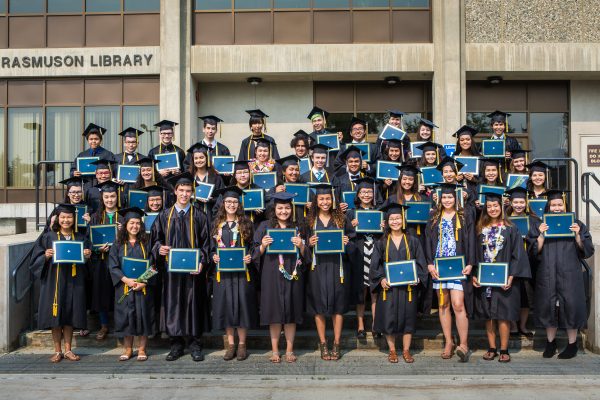Rural Alaska Honors Institute graduates set academic record
July 25, 2017
Leona Long
(907) 474-5086

Forty-two Alaska Native and rural high school students graduated earlier this month from the ║┌┴¤│ď╣¤═°ÔÇÖ Rural Alaska Honors Institute with the highest average GPA in the programÔÇÖs 35-year history.
The students earned an average GPA of 3.68 during their six weeks of living as university students in Fairbanks, doing community service projects and taking on challenging academic work.
ÔÇťFor many students participating in the Rural Alaska Honors Institute is a life-changing experience,ÔÇŁ said Denise Wartes, RAHIÔÇÖs program manager. ÔÇťWhile at the Troth YeddhaÔÇÖ campus, these students learn how to successfully transition from their village or rural community to become successful university students. These students return to their communities ready to grow into leadership positions in their communities and Alaska.ÔÇŁ
The 42 students came from 20 rural communities and Alaska Native villages, as well as Fairbanks and Anchorage. Three students had parents who attended RAHI. Nine students had a sibling who had attended earlier.
The graduation ceremony included speeches by RAHIÔÇÖs top students and a keynote address by Nathan McCowan, a 1994 RAHI alumnus who is now the president and CEO at St. George Tanaq Corp. in Anchorage. The RAHI valedictorian was Brian Conwell from Unalaska.
Salutatorian Elena Jacobs, of Bethel, spoke and invited the 17 other students who earned straight As to join her on stage to share the honor. The valedictorian for RAHI research was Ana Stringer from Barrow.
RAHI prepares students for academic achievement and to grow into leadership positions in their communities and Alaska. RAHIÔÇÖs 2016 valedictorian, Wilfried Zibell, was accepted to Harvard and Yale universities and will study government at Harvard this fall. James Flemings and Taylor Holman, also part of the 2016 RAHI class, are summer interns for U.S. Sen. Lisa Murkowski in Washington, D.C.
Under the direction of UAF postdoctoral fellow Holly McKinney, the eight RAHI research students studied ancient DNA in dog bones from an archaeological dig. They ended their coursework with a field trip to the Shaw Creek Archaeological Field School southeast of Fairbanks. The students presented their research findings in a report and poster.
ÔÇťParticipating in the Rural Alaska Honors Institute gives rural and Alaska Native students the confidence and credentials to achieve their goals,ÔÇŁ said Wartes. ÔÇťIn May, alumnus Ben Renshaw from Healy graduated from the University of Washington medical school, and two other alumni are attending medical school as well. RAHI provides a rigorous academic curriculum that helps students stand out, whether itÔÇÖs at an elite university, medical school or prestigious law school.ÔÇŁ
Since its inception in 1983 at the request of the Alaska Federation of Natives, RAHI has prepared more than 1,800 rural and Alaska Native high school students to adjust academically and socially to college life. During the six weeks of living in on-campus housing, students earn up to 11 college credits. In addition to required courses in English, library science, study skills and transitioning to college, traditional RAHI students choose from electives in process technology, business, chemistry and math. Three times a week, students choose from taekwondo, yoga or Alaska Native dance classes.
Students also had the opportunity to meet with University of Alaska President Jim Johnsen and Alaska Army National Guard Col. Wayne Don, a RAHI alumnus who will be a co-keynote speaker for this yearÔÇÖs Alaska Federation of Natives convention.
Compared to other rural Alaska Native students, RAHI students are twice as likely to successfully earn a bachelorÔÇÖs degree (19 percent vs. 10 percent), according to an independent study by the American Institutes for Research. The research also measured studentsÔÇÖ University of Alaska grade point averages and discovered that RAHI students achieve ÔÇťsuperior academic performanceÔÇŁ while attending the University of Alaska.
RAHI is made possible by the generous financial support from the UAF ║┌┴¤│ď╣¤═° of Rural and Community Development and sponsors like Wells Fargo, New York Life, Alyeska Pipeline Service Co., Arctic Slope Community Foundation, First National BAnk of Alaska, Sitnasuak Native Corp., ConocoPhillips, Shell, Future Educators of Alaska, NANA Management Services, Ravn Alaska, Boeing, Crowley, and Kuukpik Corp. Students attend at no cost and have their travel expenses paid.
ONLINE:.
ADDITIONAL CONTACT: Denise Wartes, Rural Alaska Honors Institute, 907-322-0069 cell
RAHI Class of 2017
Kayci Andrews, Mountain Village
Katie Beans, St. Marys
Harding Black, Selawik
Kayla Booth, Kotzebue
Tirzah Bryant, Galena
Taylor Burkett, Grayling
Jawn Carl, Kipnuk
Henry Charles, Kasigluk
Annalise Contreras, Nome
Megan Contreras, Nome
Brian Conwell, Unalaska
Bazaal Emelianoff, Wainwright
Tanya Hall, Noatak
Naomi Hernandez, Utqiagvik
Julie Jackson, Nome
Kylee Jackson, Ketchikan
Elena Jacobs, Bethel/Wasilla
David Kokrine, Fairbanks
Cassidy Kramer, Kotzebue
Miriam Kulowiyi, Savoonga
Jonathan Le, Unalaska
Dalton Macar, Crooked Creek
Annie Masterman, Bethel
Harrison Moore, Nome
Daphne Mueller, Utqiagvik
Bridget Nalam, Unalaska
McJun Nobleza, Utqiagvik
Miya Page, Noatak
Nicole Patkotak, Utqiagvik/ Anchorage
Leanida Polushkin, Homer
Ana Stringer, Utqiagvik
Misty Sundown, Scammon Bay
Regina Tuluk, Chevak
June Tuluk, Chevak
Karlon Tuluk, Chevak
Alyssa Tungul, Unalaska
Denae Ulak, Scammon Bay
Samantha Wade, Wainwright
David Wilcox, Sitka
Jayna Wolgemuth, Utqiagvik
Charles Wolgemuth, Utqiagvik
Jasmine Woods, Anchorage


